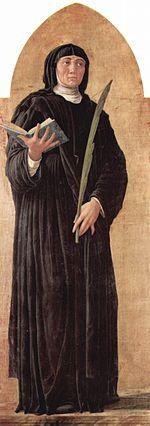
Feast day: 4 February
St Scholastica was born in 480, in Nursia, Umbria, of wealthy parents, and was the sister of St Benedict, possibly his twin. She was devoted to God from an early age. When Benedict founded his monastery at Monte Casino, Scholastica founded a convent or possibly a hermitage in the nearby town of Plombariola. In her writings to Mother Flavia Scholastica she said that her brother Benedict gave her the name, saying that "she was destined to remain in the school of the Lord’s service."
There is a well-known story of Benedict and Scholastica. They used to meet once a year, in a farmhouse as neither could enter the other's monastery. They loved to talk and share spiritual insights. After supper on one of these occasions Scholastica, knowing that this would be their last meeting, begged her brother to stay the night. This was strictly against his own Rule and he refused. Scholastica prayed and a violent storm erupted. "What have you done?" cried Benedict. "I asked you and you would not listen," his sister replied, "so I asked my God and he did listen. So now go off if you can leave me and return to your monastery." Of course Benedict was unable to do so and they spent the night talking. Three days later he saw his sister’s soul ascending to Heaven in the form of a shining white dove. He brought her body to his monastery, where he laid her in a tomb he had prepared for himself.
All the information we have about Scholastica comes from the Dialogues of Gregory the Great (540-604). At least one scholar has suggested that he invented her to demonstrate that love supersedes law; however, there seems to be evidence from early calendars and place names that she did in fact exist. Gregory names as his sources four of Benedict's contemporaries including St Caesarius, who wrote a rule for women. Scholastica’s cult grew in importance in medieval England, her feast day being included in the Anglo-Saxon calendars, and also she appeared in many litanies. The seventh-century poet Aldheim wrote about her in both the prose and verse sections of his De Virginitate and in the tenth century Aelfric of Cerne included her in his homily on St Benedict.
St Scholastica, pray for us.